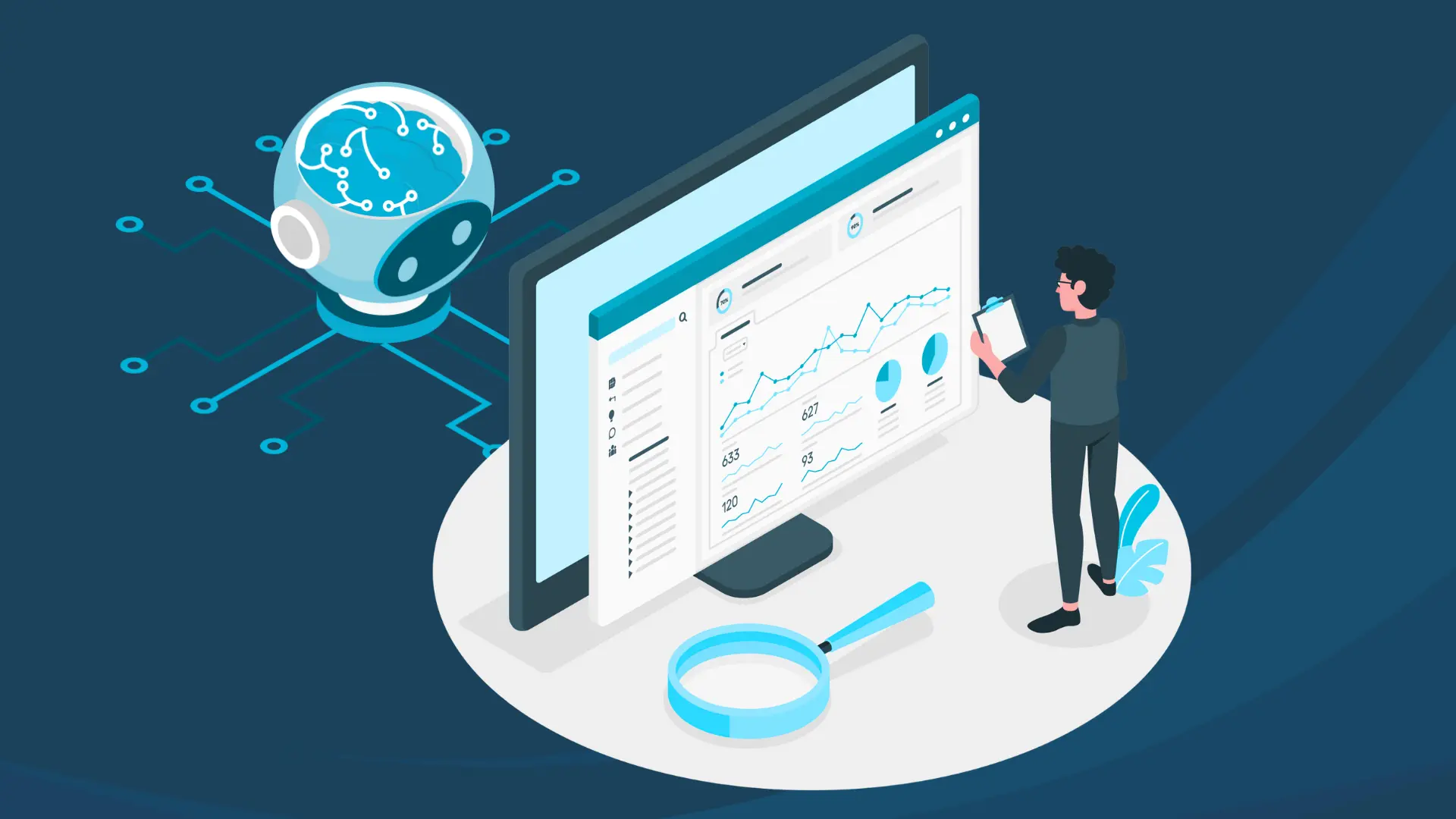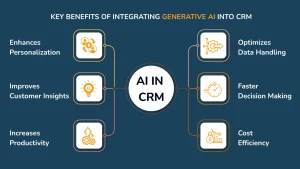The convergence of Generative AI in CRM marks a new era in business technology. With Generative AI, CRM systems have the ability to automate complex tasks, personalize interactions, and generate actionable insights at scale. For businesses, AI CRM integration is no longer a future vision but a strategic necessity.
Current industry studies report that 87% of companies intend to adopt AI CRM system solutions through 2025, with early movers experiencing a 34% improvement in customer satisfaction scores. This growth in adoption is a demonstration of the technology’s maturity and positive ROI across numerous industries, most notably in AI customer engagement use cases.
The benefits of AI in CRM include improved efficiency, increased personalization, and accelerated growth, and it is a game-changer for businesses that desire to be competitive.
What is Generative AI and How Does It Work in CRM?
Generative AI is advanced artificial intelligence with the ability to create new content, perform complex work, and create deep insights through learning from vast datasets. For CRM, generative AI applies natural language processing, predictive analytics, and data automation to:
- Develop customized communications
- Automate case management processes
- Evaluate client interactions for actionable insights
Modern CRM platforms now embed these AI capabilities, empowering firms to manage high volumes of client data, automate documentation, and provide customized client support while maintaining compliance and accuracy.
Key Benefits of Integrating Generative AI Into CRM
Enhanced Personalization
With generative AI customer experience solutions, companies are able to segment clients by their individual profiles and needs. Dynamic content generation makes sure that each message, whether a status update, a reminder, or a follow-up, is on time, relevant, and compliant.
Increased Productivity
Integration of AI with CRM automates repetitive administrative work like data entry, appointment scheduling, and document management. Your staff then gets the freedom to focus on high-value client consultations and complex casework.
Improved Customer Insights
AI customer relationship management delivers in real-time analysis of client communications and sentiment, allowing you to identify at-risk clients, set priority on mission-critical cases, and respond to concerns proactively, which is critical for companies handling sensitive financial matters.
Data Management Automation
Generative AI keeps client records always up-to-date and accurate by automatically cleansing, enriching, and deduplicating data. Integration with other business apps delivers a single, 360-degree view of each client’s journey.
Faster Decision Making
AI-powered dashboards and assistants give instant access to case histories, compliance alerts, and actionable insights, allowing your staff to make rapid and informed decisions.
Cost Reduction and Scalability
With automation of repetitive tasks, AI-powered CRM systems allow your law firm to service more clients and complex cases without commensurate increases in staff, thus realizing utmost scalability and profitability.
Top Use Cases for Generative AI in CRM
Sales Automation
AI-generated follow-up emails and intelligent lead qualification help nurture prospects and convert inquiries into loyal clients. Additionally, automated pipeline management and forecasting ensure no opportunity is missed.
Marketing Personalization
Automated campaign content creation (emails, newsletters, service updates) ensures every communication is compliant and tailored to client segments. This personalization is further enhanced by dynamic audience segmentation and A/B testing, optimizing outreach effectiveness.
Customer Support
Chatbots and virtual assistants provide instant answers to common questions, freeing your team to handle more complex client issues. Additionally, automated ticket categorization and escalation ensure urgent matters are prioritized.
Data-Driven Decision Support
Real-time reporting and analytics via conversational AI tools support compliance tracking and performance monitoring. AI suggests upselling, cross-selling, and retention strategies based on client history and needs.
Implementation Tips and Best Practices
Assess Readiness
Evaluate your current CRM and data management processes to ensure a smooth transition to AI-powered solutions.
Choose the Right Tools
Choose tools that offer strong security, compliance features, and seamless integration with your existing tech stack.
Pilot and Scale
Pilot AI capabilities in a single department or process to measure impact before scaling.
Monitor and Refine
Use analytics to track performance, refine AI models, and ensure ongoing compliance and quality.
Challenges and Considerations
Data Privacy
Ensure your AI-powered CRM complies with all relevant regulations and protects sensitive client data at every step.
Change Management
Prepare your team for new workflows and foster a culture of innovation and continuous improvement.
Continuous Learning
Regularly update AI models with new data and feedback to maintain accuracy and relevance.
Case Study Spotlight: Real-World AI CRM Integration Success
Nablasol’s partnership with Community Tax exemplifies how AI-driven CRM automation can transform customer experience and operational efficiency. By automating workflows across marketing, lead management, case handling, and integrating phone systems with SugarCRM, Community Tax achieved an 80% same-day client enrollment rate and improved customer engagement across multiple touchpoints. This case highlights the power of an AI CRM system to streamline complex processes and deliver superior client service. Read the complete case study.
Conclusion
Integrating generative AI into CRM is a strategic move for companies and firms aiming to deliver exceptional, compliant client service. The combination of automation, personalization, and actionable insights positions your organization to thrive in an increasingly complex and regulated environment. Now is the time to explore AI-powered CRM solutions and take your client management to the next level.
FAQs
How AI helps in CRM?
AI helps CRM by automating tasks, personalizing customer interactions, providing real-time insights, improving sales and marketing efficiency, enhancing customer support with chatbots, and ensuring accurate data management. This boosts productivity, customer satisfaction, and business growth.
What is CRM automation?
CRM automation uses technology to automate repetitive tasks like data entry, lead nurturing, and customer follow-ups, improving efficiency, accuracy, and customer engagement while freeing teams to focus on strategic work.
What is the future of AI in CRM?
The future of AI in CRM involves smarter automation, predictive insights, hyper-personalization, enhanced customer support, real-time decision-making, and stronger data security, helping businesses improve efficiency, engagement, and growth.
What kind of AI is used in customer service?
Customer service uses AI like chatbots, natural language processing (NLP), intelligent ticket routing, generative AI for personalized responses, and predictive analytics to automate support, understand customer needs, and improve response times.
What is AI in taxation?
AI in taxation uses technologies like machine learning and generative AI to automate tax filing, analyze data for compliance and fraud detection, provide personalized taxpayer assistance, and streamline complex tax processes for greater efficiency and accuracy.




